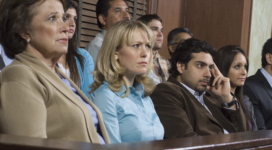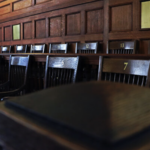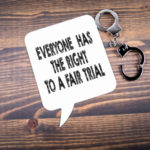The Impact of Juror Misconduct on the Right to a Fair Trial

The rise of the internet and social media platforms such as Facebook and Twitter, where it seems everyone has an opinion regardless of the credibility of the facts to which they are privy, has led to a corresponding increase in the likelihood jurors in criminal trials will consider information and material that has not been admitted into evidence – which can amount to the offence of juror misconduct in New South Wales.
The right to a fair trial
Offences relating to juror misconduct have been enacted to increase the likelihood of a fair trial by an impartial jury.
The idea is that having the offence in place may deter jurors from considering irrelevant information and thereby make it more likely they will only consider admissible evidence when reaching their verdict of guilty or not guilty.
Although the right to a fair trial is not expressly guaranteed by the Australian Constitution, the High Court of Australia has described it as “being a central pillar of our criminal justice system”; Dietrich v The Queen [1992] HCA 57.
And while the common law right has many aspects, one of the most important is the right to be adjudicated by a fact-finder (whether a magistrate, judge or jury) based solely on admissible evidence; in other words, to the exclusion of information and material that has not been assessed for important considerations such as relevance or vetted for factors which may cause it to be unreliable (such as hearsay, opinion and admissions) or otherwise unfairly prejudicial.
For a fact-finder to consider something seen on an unreliable social media platform such as Facebook or read in a tabloid newspaper like The Daily Telegraph when reaching a decision regarding a person’s guilt or otherwise in relation to a criminal offence clearly has the potential to cause injustice.
It is for this reason that it’s so important for jurors to be deterred from making outside inquiries.
Examples of juror misconduct
In a high-profile Western Australian murder trial in 2016, a juror was discharged shortly after being empaneled for posting on social media that the defendants were “guilty”. He apparently came to this decision before the trial had even commenced.
And in the highly-publicised case of an 85-year old man accused of killing a woman and burying her in his backyard in 1992, the ensuing trial was aborted (cancelled) after a jury member’s girlfriend researched details of the defendant’s past criminal matters and disclosed these to her partner.
And of course there is the trial of Bruce Lehrmann, the man accused of sexually assaulting Brittany Higgins in Parliament House, Canberra in 2019, which was aborted last month and rescheduled for February 2023 after a Sheriff who was tidying up the jury deliberation room knocked over a folder causing a report about sexual assault to spill out. The report had not been admitted into evidence.
Media reporting makes getting a fair trial impossible
In the last-mentioned case, it is difficult to see how Mr Lehrmann will ever receive a fair trial given the media coverage, which has overwhelmingly supported the complainant and her version of the events.
Indeed, the mainstream media seem to have unquestioningly taken as Gospel the word of an intoxicated woman with partial recollection who was found naked and disoriented in an office inside Parliament House after going there with her colleague, despite that colleague consistently maintaining his innocence.
Some of the reporting has the potential to amount to contempt of court, including on-air comments by media personalities such as reporter Lisa Wilkinson and radio hosts Brendan Jones and Amanda Keller; which were made after the trial judge directed media outlets not to make them.
The heavily biased remarks by these personalities, which reached millions, ended up causing Mr Lehrmann’s trial to be delayed from 21 June until 4 October 2022.
Even Prime Minister of Australia, Scott Morrison, chimed in, proclaiming in Parliament that he was for was sorry for what Ms Higgins had gone through.
The complainant, who is now a media darling reportedly making hundreds of thousands of dollars for interviews and a book deal, has herself been reported to police for potential contempt of court charges over her statements to the media outside the courthouse immediately following the trial’s recent abortion. She did this in the face of the judge’s directions not to do so.
With his reputation and career in tatters – as a result of his presumption of innocence being thrown out the window by people of influence – Mr Lehrmann now faces months more of stress, anxiety and financial hardship to learn his ultimate fate.
Many cases of juror misconduct go undetected
In many such cases, the misconduct is only discovered due to the brazenness of those who engage in it (such as the juror who posted “guilty” and the one who had the audacity, in contravention of the judge’s directions, to bring external material into the jury room) and/or fortuitously (such as latter-mentioned case).
There can be little question that many cases of juror misconduct go undetected, undermining the defendant’s right to a fair trial.
Judge alone trials
One of the ways to avoid jury misconduct is to have a case tried without a jury at all – which is known as a ‘judge alone trial’.
Applications for judge-alone trials can be made in a number of jurisdictions, including New South Wales, but they are not available for sexual assault trials in the nation’s capital – which is the jurisdiction in which Mr Lehrmann is being tried.
That jurisdiction has already refused Mr Lehrmann’s applications for a ‘permanent stay of proceedings’; an application that the case should not be tried as he can never receive a fair trial given all the adverse publicity.
The offence of juror misconduct in New South Wales
In our state, juror misconduct is a criminal offence which carries a maximum penalty of five years’ imprisonment.
The offence is contained in section 68C of the Jury Act 1977 (1977) which prohibits jurors from making an inquiry for the purpose of obtaining information about an accused, or any matters relevant to a trial except in the proper exercise of a juror’s function.
It applies to a juror from the time the juror is sworn in until he or she, or the jury of which he or she is a member, is discharged by the court.
‘Making an enquiry’ encompasses:
(a) asking a question of any person, including a spouse or family member who is not a juror,
(b) conducting any research, for example, by searching an electronic database for information (such as by using the Internet),
(c) viewing or inspecting any place or object,
(d) conducting an experiment, or
(e) causing someone else to make an inquiry.
The offence further covers anything done by a juror in contravention of a judge’s direction/s.
It does not prohibit a juror from making an enquiry:
(a) of the court, or of another member of the jury, in the proper exercise of his or her functions as a juror, or
(b) that is authorised by the court.
Not all jurisdictions categorise jury misconduct as a crime
By contrast, such conduct is not considered a crime in the ACT or in Western Australia, although there have long been calls to change the laws here.
The reluctance of these jurisdictions to make it a crime largely is primarily due to the fact that jurors – although they are paid for jury duty – give their time to ensure that justice is served, and making such conduct a crime has the potential to increase the likelihood of those called up for jury duty applying to be excused.






